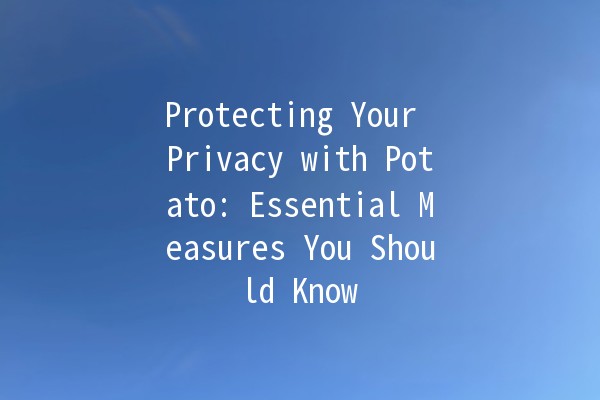In today's digital age, privacy is paramount. As we share more personal information online, the demand for robust privacy measures has surged. One platform that has been gaining attention for its commitment to user privacy is Potato, a Chinese application that combines fun with functionality. This article delves into the privacy protection measures offered by Potato, exploring practical tips and techniques to enhance your security while using the platform.
Understanding Potato’s Privacy Policies
Before diving into the practical aspects of privacy protection, it’s crucial to understand what Potato stands for when it comes to privacy. The application prioritizes user confidentiality, ensuring that data collection is minimal and only what is essential for functionality. Here are key elements of Potato’s privacy policies:
Data Minimization: Potato adheres to the principle of collecting only the necessary data from users, significantly reducing potential privacy breaches.
User Control: Users are empowered with options to manage their privacy settings, including data visibility and sharing permissions.
Anonymity Features: Potato offers options to use the app anonymously, minimizing the exposure of personal information.
Regular Audits: The platform underwent regular thirdparty audits to ensure compliance with privacy standards.

Practical Privacy Enhancement Tips for Potato Users
Explanation: One of the most effective ways to enhance your privacy is to familiarize yourself with the application's privacy settings.
Application Example: Navigate to the settings menu after logging into Potato. You can adjust who sees your profile, manage friend requests, and restrict the visibility of your activities. Regularly revisiting these settings is essential as updates may introduce new options.
Explanation: Passwords serve as the first line of defense against unauthorized access. Using complex and unique passwords is fundamental.
Application Example: Consider using a combination of letters, numbers, and special characters to create a strong password. Additionally, a password manager can help store unique passwords for each application, including Potato.
Explanation: Twofactor authentication adds an extra layer of security to your account by requiring a second form of verification.
Application Example: Check if Potato supports 2FA. If it does, enable it and link it to a trusted email or phone number. This step is crucial, especially if you share sensitive information on the platform.
Explanation: While some apps may request permission to share data with thirdparty services for advertising purposes, it’s essential to restrict this.
Application Example: During app setup, pay close attention to sharing options. Optout of data sharing whenever possible. You can usually find these settings in the app’s privacy policy section.
Explanation: Apps often request permissions to access various features on your device. Regularly revoking unnecessary permissions can significantly enhance your privacy.
Application Example: Go to your device settings, locate the Potato app, and review the permissions it has been granted. If the app doesn't require access to your contacts or location for its core functionalities, revoke those permissions.
Common Questions About Potato's Privacy Measures
Potato primarily collects data necessary for its features to function correctly, which may include user profiles, chat history, and activity logs. They emphasize data minimization, so only what is essential is collected. Always check the privacy policy updates for detailed information.
Yes, Potato provides options for users to delete their accounts and any associated data. This option is usually located in the account settings. Before proceeding, ensure you understand that this action is usually irreversible.
In the event of a data breach, Potato has protocols in place for prompt notification to affected users. Their transparency about data breaches ensures that you are informed and can take necessary actions to protect yourself.
Potato employs encryption and security protocols to protect data storage and transmission. However, users must also take personal measures to enhance security, such as the tips mentioned earlier.
If you suspect your Potato account has been compromised, immediately change your password and enable 2FA if it's not already activated. Reach out to Potato’s support for advice and assistance in securing your account.
Yes, Potato offers features such as anonymous browsing and data visibility settings, allowing users to control who can see their content or interact with them on the platform. These features distinguish Potato from many other applications that don’t offer such granular privacy controls.
Navigating the digital landscape requires a proactive approach to privacy protection, especially when using platforms like Potato. By implementing the tips highlighted in this article, users can significantly enhance their privacy and security while enjoying the numerous functionalities Potato offers. Remember, your privacy is primarily your responsibility, and taking these steps is essential to safeguard your digital self.
By incorporating a blend of technical understanding and practical application, this guide can serve as a useful resource for new and existing Potato users who are keen on protecting their privacy while enjoying the app's unique features. Always stay informed about the latest in privacy technologies and practices to ensure a secure experience online.